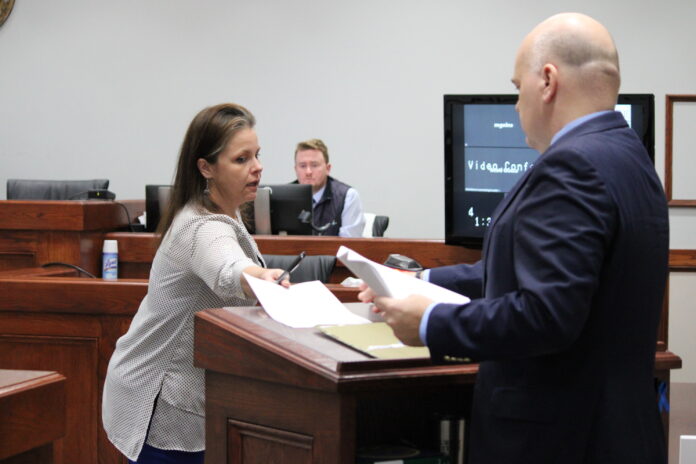MURRAY – With the presentation of her case to the grand jury 10 days away, Chyanne Niemeyer’s attorney appeared before Calloway Circuit Judge Andrea Moore today, requesting the judge to direct the Murray Police Department to collect and preserve what is believed to be relevant evidence in addition to requesting the defense be able to present evidence to the grand jury.
Niemeyer, 24, of Murray, was charged with murder and first-degree criminal abuse of a child under 12 years of age on Oct. 23, after she and her fiancé, Nathaniel Gibson, 20, who faces similar charges, brought her unresponsive 17-month-old daughter to the Murray-Calloway County Hospital Emergency Room, where staff contacted the MPD after deeming the child’s extreme burn injuries suspicious. Both Niemeyer and Gibson told authorities the child suffered the burns while taking a bath.
In her motion to collect and preserve evidence, Cheri Riedel, directing attorney for the Kentucky Department of Public Advocacy’s Murray Trial Office, specifically requests that the water heater and bathtub faucet from Niemeyer’s apartment be collected and preserved. She argues that there is no evidence in the Kentucky Incident Based Reporting System (KYIBRS) report from the investigation that the police department inspected or tested “in any way” either the water heater or the faucet.
“Whether or not the water heater and faucet were operating correctly and safely bears on the culpability of the defendants,” the motion states. “If the water heater and/or faucet were dangerous and defective at the time the burns occurred, that would be exculpatory for Ms. Niemeyer. … If the water heater and faucet are not collected, and are repaired, altered, or replaced, the evidence of their condition will be forever destroyed, causing irreversible prejudice to Ms. Niemeyer.”
Riedel further argues that the U.S. Supreme Court ruled that due process rights of a criminal defendant can be violated by “’failure to preserve potentially useful evidence’ when bad faith on the part of the police is demonstrated.”
By way of another filing, Riedel requested to present evidence to the grand jury on Nov. 16, the day before the Commonwealth is scheduled to present its case. Specifically, the defense requested the grand jury “be given the opportunity to review provided documents related to the unsafe conditions and code violations regarding the apartment the defendant was residing in,” and that it be shown a psychological evaluation of Niemeyer’s intellectual abilities conducted in November 2011 that details “her extremely low intellectual and adaptive functioning.”
Riedel also requested the grand jury “be informed that they can request to subpoena the inspectors or other witnesses mentioned in the information provided” and further “be advised about the full range of possible lesser offenses” along with their legal definitions.
Ultimately, despite the case being on the docket, there was no hearing today on either request. The issue at hand is one of jurisdiction. Niemeyer waived her right to a preliminary hearing before Calloway District Judge Randall Hutchens on Nov. 1, her case advanced to the grand jury; and without an indictment from the grand jury, the case does not yet fall under the jurisdiction of the Calloway Circuit Court.
“At this point, I don’t believe that I have jurisdiction to hear the defense’s request in regard to (directing) the Murray Police Department to collect and preserve relevant evidence,” Moore explained. “So, at this time, without (an indictment), I cannot make a ruling or hear the evidence in regard to this motion.”
Although there was no ruling on the request to present evidence either, Commonwealth’s Attorney Dennis Foust advised the court that his office will comply with the defendant’s request to present evidence to the grand jury.
“What that means is that we will follow the criminal rule that requires us to advise a grand jury that a defendant desires to present evidence to the grand jury,” Foust later clarified via text. “Any other specifics will be within the province of the grand jury. But as a practical matter, much of (Riedel’s) requests are things we automatically do.”
“There is far more to the story,” Riedel said in a text after the hearing, “and I hope that the public remembers that folks charged with crimes are innocent until proven guilty beyond a reasonable doubt.”




